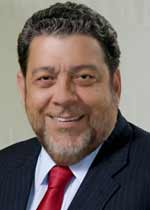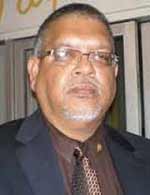THE Caribbean Association of Industry and Commerce (CAIC) wants regional governments and the CARICOM Secretariat to consult with the organisation on issues affecting the private sector and the region’s economies.

The organisation has advised CARICOM Secretary General, Irwin la Rocque of its recent reconstitution and has requested a meeting to discuss the role of the CAIC in the integration movement and how it can provide input into regional policies and programmes.
The Region’s heads of government have supported the establishment of a Caribbean Business Council as an avenue for collaboration between the governments and the private sector. The CBC has stalled with legal groundwork to establish it still on-going

President of the recently resuscitated umbrella private sector organisation, Ramesh Dookhoo, feels CARICOM countries have become complacent are not changing to adapt to the changing international consumer that uses the region’s products and services.
“We need to consolidate our collective efforts to buy Caribbean, we need to invest in each other’s’ countries in areas where there is a competitive advantage. We also need to exploit our food potential to enable us to reduce that huge food bill and to collaborate to take care of the collective Caribbean economy,” the Guyanese business executive told me.
CAIC wants to see a harmonization in standards, currency, employment and skills in CARICOM Member States. ‘We want regular updates from the Region’s governments on steps being taken to accomplish this.”
More dialogue needed on trade negotiations

The current CAIC leadership wants to have an input in external trade negotiations. Dookhoo deems “inappropriate” the current situation whereby Caribbean Export Development Agency (CEDA), an inter-governmental organisation, is representing the private sector at trade negotiations.
On the current CARICOM-Canada negotiations on a Trade and Development Agreement, CAIC wants more feedback from governments as most of the information the private sector has is from the Canadian side.
“Various countries have differing degrees of briefings but there are no central briefings going on. Rum dominates the conversation quite rightly but what about emerging Caribbean Sectors. We would like to know what and who represents these interests,” Dookhoo, a former Chairman of the Guyana Private Sector Commission, commented.
CAIC is also calling for more disbursements with equity from the European Development Fund (EDF), including a simplified system of accessing funds under the CARIFORUM-EU Economic Partnership Agreement (EPA).
The organisation is also urging the Region’s governments to demonstrate “political will” to fully implement the CARICOM Single Market and Economy (CSME).
Some of the issues outlined by the CAIC President are among those on the agenda of next month’s Inter-Sessional meeting of CARICOM Heads of Government in St. Vincent and the Grenadines.
CARICOM Chairman wants movement on Single Market
Like the private sector, the current Chairman of CARICOM, St. Vincent and the Grenadines Prime Minister, Dr. Ralph Gonsalves, wants to see some forward movement on the CSME and external trade negotiations, including with Canada.
Gonsalves is also urging his fellow heads of government to take action on issues related to the Region’s economies including job creation, climate change and citizen security. These are among the 12- point agenda of priority issues which he intends to focus on during his six-month Chairmanship and which he identified in a letter last month to the CARICOM Secretary General.
In a recent conversation with Gonsalves, he told me he is looking forward at next month’s meeting to receiving updates on the work of the CARICOM Commission on the Economy, which was mandated to address priority areas for fiscal sustainability, resource mobilisation as well as critical economic infrastructure services, particularly energy and ICT (Information Communication Technology).
In 2014, Gonsalves also wants his colleague CARICOM leaders address and take action on energy access, cost and reliability, follow up on the denationalisation of persons of Haitian descent in The Dominican Republic, which CARICOM has denounced, and facilitate improved relations between Cuba and the U.S.
Regional Transportations Issues
Gonsalves, who has lead responsibility for transportation issues, said he is keen on seeing speedy action on issues in this area and noted that that the revamped CARICOM Multilateral Air Services Agreement is ready for signature.
Following the recent meeting of the Regional Transportation Commission, it was disclosed that Government owned air carriers in the Region have identified the procurement of equipment, training of personnel, scheduling of flights, and maintenance of aircrafts as some of the areas where cooperation is possible.
Gonsalves believes the key to the problems affecting LIAT is for more governments to become shareholders. Dominica recently joined Antigua and Barbuda, Barbados and St Vincent and the Grenadines as a shareholder. Gonsalves is still trying to persuade the St. Lucia government to go this route.
The Vincentian leader suggests that to improve efficiency and lower costs, Eastern Caribbean countries should have one large management company manage all the airports in the Sub-Region.
Against the backdrop of the calls by the Region’s hospitality industry for governments to reduce taxes on the industry, Gonsalves said governments have to collect revenue to upgrade airports and other tourism-related infrastructure. He contends that new private sector investment is critical for improving and expanding both sea and air transportation and governments can help private investors by offering them concessions similar to what obtains in Kingstown.
Ferries registered and operating in St. Vincent and The Grenadines are imported tax-free, pay no tax on their earnings, and there is no value-added tax on the service.
When Gonsalves meets with his CARICOM colleagues, his call for “a reasoned debate”, led by CARICOM political and civic leadership, on the legislation of marijuana will face opposition from Guyana and Jamaica and likely other CARICOM countries. Guyana’s Minister of Home Affairs, Clement Rohee has reaffirmed his Government’s zero-tolerance policy on all drugs that are deemed illicit, including marijuana, while Jamaica’s Foreign Affairs Minister, A.J. Nicholson has stated that this was “definitely out of the question “at this time.
Climate Change effects on the economies of CARICOM Member States is understandably a subject which the Vincentian leader wants to see treated with some urgency. St. Vincent and The Grenadines was among CARICOM those that suffered millions of dollars in damages and loss of life from recent floods.
Gonsalves believes the Region has to aggressively pursue international funds which are available for adaptation and mitigation to climate change and for the Caricom Climate Change Centre in Belize to play a bigger role.
The CARICOM Chairman regards 2013 as a year of “incremental progress” for the regional integration movement.
He feels too much emphasis is being placed on the role of CARICOM “Change Drivers”, and stressed that these appointments should not be “a substitute for political leadership”.
More action needed on Freedom of Movement
Gonsalves wants to see Member States meet their responsibilities to facilitate the freedom of movement of CARICOM nationals as outlined in the ruling of the Caribbean Court of Justice (CCJ) in the case of Jamaican Shanique Myrie against Barbados. Myrie reported that she was subjected by Barbadian immigration officials to a body-cavity search in unsanitary and demeaning conditions before being detained and deported the next day to Jamaica.
The CARICOM Chairman feels more needs to be done to ensure that immigration officers across the Region uphold the law, including on-going training and sensitising so that they implement government policies and don’t do their own thing.
Gonsalves, who has previously in this column, called for the Trinidad and Tobago government to be more engaged in CARICOM, told me he has seen a “greater sensitivity to the Region” by the Kamla Persad-Bissessar administration.
Gonsalves said theTrinidadian government’s input at CARICOM Summits and reaction to natural disasters is evidence of a “better spirit” displayed by the twin-island Republic.
(Sandra Ann Baptiste is a Business Consultant and Specialist in Caribbean Affairs)
(By Sandra Ann Baptiste)



.jpg)











